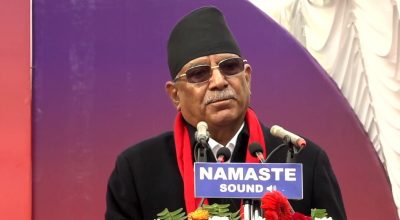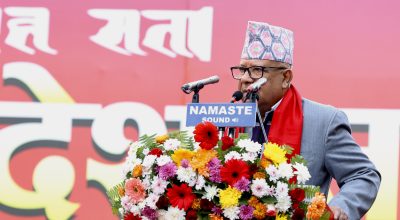
TEL AVIV – Another front has opened in the global rise of populist authoritarianism. With their efforts to weaken Israel’s independent judiciary, Prime Minister Binyamin Netanyahu and his corrupt coalition of Messianic fascists and ultra-Orthodox allies are determined to translate their anti-democratic rhetoric into authoritarian policy.
Make no mistake: Israel’s democracy has long been compromised. The brutal occupation of the Palestinian territories is fundamentally incompatible with democratic values. And Israel’s system of checks and balances is weak: Israel does not have a formal constitution or a bicameral parliament, and, in the absence of a presidential veto, the Knesset (parliament) is fully controlled by the executive branch.
But the measures Netanyahu’s new government has pursued since December would eliminate the last remaining check on its power. In particular, a proposed judicial reform would give the government greater influence over the appointment of judges, and enable an absolute parliamentary majority to reverse Supreme Court decisions striking down legislation.
The government’s overhaul of the legal system could allow Netanyahu’s Knesset allies to halt his ongoing criminal trial on charges of bribery and breach of trust. The Knesset may also be able to remove court-imposed brakes on the expansion of Jewish settlements in Palestinian territories.
The Israeli coalition’s Orwellian justification for its actions is that the judiciary has become overly activist in recent years, undermining public trust and “governability.” What this really means is that judges are hampering the Netanyahu government’s ability to run roughshod over the rule of law.
There was a time when Netanyahu defended the judiciary. In 2012, he vowed to halt any bill aimed at weakening the Supreme Court. “Rights cannot be protected without strong, independent courts,” he declared. But this was expedient: defending the judiciary was expedient to Netanyahu’s interest – the focus of his entire political career – in perpetuating his power.
No more. Today, Netanyahu’s political ambitions depend on a cabal of lawbreakers and cynical profiteers. The interior minister has been convicted of bribery, fraud, and tax crimes, and the minister of national security – a disciple of the late Judeo-fascist rabbi Meir Kahane – has eight convictions for incitement to racism. The housing minister made a fortune from government subsidies to ultra-Orthodox institutions.
Netanyahu must find ways to satisfy his allies. This explains his pledges to safeguard extravagant budgets for ultra-Orthodox schools – where the curriculum leaves out core subjects like math, English, and science – and to formalize seminary students’ exemption from military service.
It also explains why half of the members of Netanyahu’s 64-seat bloc in the 120-member Knesset are ministers and deputy ministers. This has required creating ministries out of thin air, splitting others, and handing out overlapping appointments with clashing responsibilities. Bezalel Smotrich, for example, is both the finance minister and the “second defense minister,” responsible for Israel’s Civil Administration in the West Bank.
To secure Israel’s full annexation of occupied Palestinian lands, Smotrich, the chairman of the Religious Zionist Party, co-sponsored in 2021 a bill that would have abolished the Civil Administration. Giving him authority over the occupation is tantamount to recognizing that annexation. With that, any remaining illusion that the occupation is temporary, and thus that Israel is not an apartheid state, would be destroyed.
Meanwhile, the Ministry of Foreign Affairs will be led by two members of Netanyahu’s Likud party, in rotation – a system that will do nothing to revive a crucial but crippled institution. And the newly reconstituted Ministry of Strategic Affairs will be led by Netanyahu’s confidante, Ron Dermer – a former ambassador to the United States who conspired with congressional Republicans in an effort to bypass President Barack Obama’s administration and scuttle US nuclear talks with Iran.
Netanyahu’s conservative allies in America continue to back his efforts to undermine democracy. The Kohelet Policy Forum – a mysterious think tank heavily financed by two Jewish-American multibillionaires – has played a central role in designing the judicial overhaul. Kohelet was also the architect of the controversial 2018 law defining Israel as the nation-state of the Jewish people.
Kohelet endorses a libertarian political philosophy, according to which people should expect little state support or protection. But for Netanyahu, the promise of small government is best honored in the breach: his constituents – Jewish settlers on occupied Palestinian land and ultra-Orthodox voters – enjoy lavish subsidies financed by high-tech industries and other engines of economic growth powered overwhelmingly by his liberal opponents.
The judicial overhaul has fueled a wave of popular resistance. Tens of thousands of Israelis have staged regular protests outside the Knesset and throughout the country, bringing Israel’s long-simmering politically charged culture war to a boiling point.
Meanwhile, the governor of the Bank of Israel, Amir Yaron, has warned that the judicial reforms could hurt the country’s credit rating, a sentiment echoed by two of his predecessors. And 300 Israeli economists and more than 50 leading foreign economists issued letters warning that weakening the judiciary “would be detrimental not only to democracy but also to economic prosperity and growth.” Fearing for the economy, some startups and venture funds have begun moving their funds out of the country. Likewise, seven Nobel Prize winners have argued that the reforms will harm Israel’s global academic and scientific standing.
Israel’s allies have further highlighted what is at stake. US President Joe Biden pointedly noted that an independent judiciary is a pillar of both American and Israeli democracy – and thus, one can infer, a cornerstone of the relationship. French President Emmanuel Macron was more explicit, reportedly telling Netanyahu that, if the reform is adopted in its current form, France will have to conclude that Israel has abandoned their common understanding of democracy. In fact, the real question is whether Netanyahu ever shared it.
Shlomo Ben-Ami, a former Israeli foreign minister, is Vice President of the Toledo International Center for Peace and the author of Prophets Without Honor: The 2000 Camp David Summit and the End of the Two-State Solution (Oxford University Press, 2022).
Copyright: Project Syndicate, 2023.
www.project-syndicate.org
















